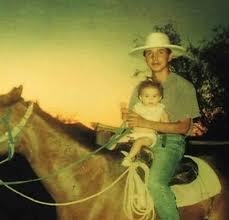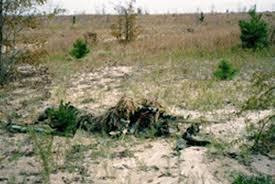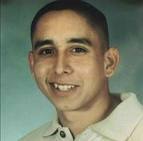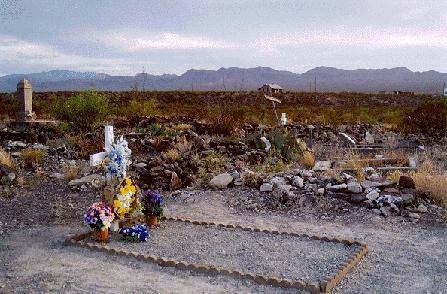If you spend time along the Rio Grande, you begin to learn that most of the history on both sides of the river is about families and cooperation. We civilized and modern Americans and Mexicans are responsible for putting up borders and cameras and pointing guns and turning the watercourse into a frontier. In fact, before westward expansion had filled up the southwest with outsiders and capital opportunities, a border was rough concept and the river was a vein that united and gave lifeblood on both banks.
Lucia Madrid, a schoolteacher who lived her many decades in the weary desert town of Redford, Texas, said, "Anglos have tried to divide it, for a different country, but no, the Rio Grande has never, never divided people."
Madrid was honored in 1990 as one of President George H. W. Bush's "Thousand Points of Light" and was also given the Ronald Reagan Award for Volunteer Excellence at the same ceremony. Mrs. Madrid spent years gathering 20,000 books for children to read at her home because the poor community of Redford, which her grandparents had helped to found, could hardly keep open a small school.
She is featured in Jefferson Morgenthaler's brilliant 2004 book, The River Has Never Divided Us, which examines the cultural and archaeological evidence of life in the region known as La Junta de los Rios, the junction of the rivers where the Rio Grande and the Rio Conchos meet in a valley that today includes the cities of Presidio and Ojinaga. Research shows it to be the longest, continually cultivated site in North America, a locale where nomadic peoples and sedentary farmers co-existed for centuries in peace.
Undoubtedly, very few of the people in Washington contemplating writing new immigration laws have even heard of Morgenthaler's work, which is a clear and considered portrait of a history and life so far removed from political discourse that even its victimization under amended policies could expect to receive little notice. (If any officeholder gives a damn, however, they will read Morgenthaler's book before even contemplating a vote.)
One of Mrs. Madrid's young students was Esequiel Hernandez, Jr., a boy whose life will not go out of my memory while I breathe, and, perhaps, even longer. I thought about Ezequiel when I heard the current Texas Attorney General Greg Abbott, candidate for governor as a Republican, say he wanted to spend $300 million on another 500 state troopers to patrol the border. Abbott, no doubt confounding potential South Texas supporters, used the phrase "third world" to claim there was "creeping corruption" along la frontera.
Esequiel Hernandez
This rhetoric of militarization and fear is what cost Esequiel Hernandez, a teenaged goat herder, his life in 1997. The U.S. government had deployed a group of Marines identified as Joint Task Force 6 to survey unmonitored border crossings for drug smugglers. Junie, as Esequiel was known to friends and family, was bringing his goat herd up from the river where they had been drinking. He sat his burro with a single shot .22-caliber rifle that he often used to fend off predators like coyote, rattlesnakes, and mountain lion coming after his goats.
When he fired at something that had been following him and the goats, four Marines noticed him. They were armed with high-powered weapons and concealed in the desert scrub wearing ghillie suits. Esequiel was tracked and flanked for 20 minutes until Marine Corporal Clemente Banuelos pulled his trigger and killed the 18 year-old with a bullet that entered under the goat herder's armpit. The commander who gave the order to fire was not on scene with the JTF6 detachment. Esequiel became the first American killed on native soil since the May 4, 1970 National Guard killings on the campus of Kent State University of Ohio during a Vietnam War protest.
Gunman in a Ghillie Suit
Banuelos, who was only four years older than Ezequiel when he looked through his scope and shot, will live all of his days with the grief of what happened when he followed a misguided command. Ezequiel had hoped to become a Marine, and a recruiting poster proclaiming a need for a few good men was on the wall over his bed in the family's modest adobe on the day he was killed. By the Marines. Two tiny American flags were taped to the wall.
Marine Corporal Clemente Banuelos, just a boy given a gun
When I heard about the story and drove west with my friend and video journalist Kirk Swann, I could not think of a sadder situation. I still cannot. Eventually, at the courthouse in Marfa, the four Marines, who should have never been placed in such an absurd situation by their government, were acquitted of any crime. Court testimony talked about "rules of engagement" but nobody living along the Rio Grande near Redford had any idea they were even being "engaged." The U.S. military should never be deployed on American soil unless the nation is being invaded.
Esequiel was buried in a rocky grave overlooking La Junta that was marked by a wooden cross, which has since been replaced by an engraved headstone. From the mesa where he was laid to rest, a visitor can see his home, the spot where he was killed, and the church where people came to visit him one last time.
His tragic tale became the subject of the compelling documentary, "The Ballad of Esequiel Hernandez," narrated by Texas actor Tommy Lee Jones, who also used the story to inspire his dramatic film, "The Three Burials of Melquiadas Estrada." More critically, the story of Esequiel ought to be an intellectual and emotional gauntlet that politicians are required to run every time they start blabbering about increased border security. We don't need more laws on our border, or more guns, or more troopers or soldiers. We need more understanding that "the river has never divided us."
And if Greg Abbott, who I am doubtful has ever heard of Esequiel, or any member of congress wants to talk about increased militarization of our border, let us demand they fly down to Redford, go up top of that mesa, and look at that lonely grave of Esequiel Hernandez, Jr. Try to take a full measure of the life he never got to live. Then tell him, quietly and respectfully, more guns are needed on the border.
And if you can't do that, then keep your goddamned mouth shut.




